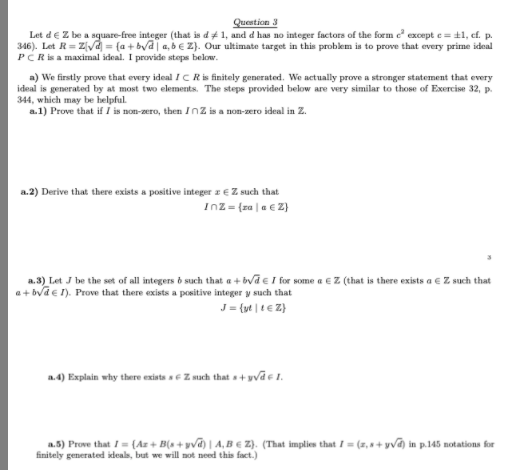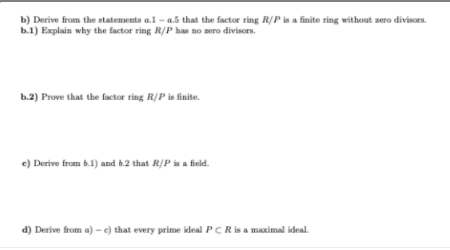Question 3 Let d€Z be a squaze-free integer (that is d# 1, and d has no integer factors of the form ² except e= a1, cf. p. 346). Let R= Z[Va = {a + bva| a, b € Z). Our ultimate target in this problem ia to prove that every prime ideal PCRia maximal ideal. I provide steps below. a) We firstly prove that every ideal ICR is finitely generated. We actually prove a stronger statement that every ideal is generated by at most two elements. The steps provided below are very similar to those of Exercise 32, p. 344, which may be helpful. a.1) Prove that if I is non-aero, then InZ is a non-zero ideal in z. a.2) Derive that there exists a positive integer z € Z such that Inz= (za |a € 2} a.3) Let J be the set of all integers b such that a+ bvd eI for some EZ (that is there exists a €Z such that a+ bva e). Prove that there exists a positive integer y such that J= {xt | 1 € Z}
Question 3 Let d€Z be a squaze-free integer (that is d# 1, and d has no integer factors of the form ² except e= a1, cf. p. 346). Let R= Z[Va = {a + bva| a, b € Z). Our ultimate target in this problem ia to prove that every prime ideal PCRia maximal ideal. I provide steps below. a) We firstly prove that every ideal ICR is finitely generated. We actually prove a stronger statement that every ideal is generated by at most two elements. The steps provided below are very similar to those of Exercise 32, p. 344, which may be helpful. a.1) Prove that if I is non-aero, then InZ is a non-zero ideal in z. a.2) Derive that there exists a positive integer z € Z such that Inz= (za |a € 2} a.3) Let J be the set of all integers b such that a+ bvd eI for some EZ (that is there exists a €Z such that a+ bva e). Prove that there exists a positive integer y such that J= {xt | 1 € Z}
Elements Of Modern Algebra
8th Edition
ISBN:9781285463230
Author:Gilbert, Linda, Jimmie
Publisher:Gilbert, Linda, Jimmie
Chapter6: More On Rings
Section6.4: Maximal Ideals (optional)
Problem 6E
Related questions
Question
Desperate help pls

Transcribed Image Text:Question 3
Let deZ be a square-free integer (that is d#1, and d has no integer factors of the form e except e = t1, cf. p.
346). Let R= ZVd = {a + byd| a, b€ Z}. Our ultimate target in this problem is to prove that every prime ideal
PCR is a maximal ideal. I provide steps below.
a) We firstly prove that every ideal IC R is finitely generated. We actually prove a stronger statement that every
ideal is generated by at most two elements. The steps provided below are very similar to those of Exercise 32, p.
344, which may be helpful.
a.1) Prove that if I is non-zero, then Inz is a non-zero ideal in Z.
a.2) Derive that there exists a positive integer z E Z such that
Inz= (za |a € 2)
a.3) Let J be the set of all integers o such that a + bva e I for some a eZ (that is there exists a € Z such that
a+ bva e 1). Prove that there exists a positive integer y such that
J = {yt | t € Z}
a.4) Explain why there exista ae Z much that a+ yvāe 1.
a.5) Prove that I = {Az + B(s + yvd) | A, B € Z). (That implies that I= (z, s+ yva) in p.145 notations for
finitely generated ideals, but we will not need this fact.)

Transcribed Image Text:b) Derive from the statements a.1 - a.5 that the factor ring R/P is a finite ring without zero divisors.
b.1) Explain why the factor ring R/P has no zero divisors.
b.2) Prove that the factor ring R/P is finite.
e) Derive from b.1) and 6.2 that R/P is a field.
d) Derive from a) - e) that every prime ideal PCR is a maximal ideal.
Expert Solution
This question has been solved!
Explore an expertly crafted, step-by-step solution for a thorough understanding of key concepts.
Step by step
Solved in 4 steps

Knowledge Booster
Learn more about
Need a deep-dive on the concept behind this application? Look no further. Learn more about this topic, advanced-math and related others by exploring similar questions and additional content below.Recommended textbooks for you

Elements Of Modern Algebra
Algebra
ISBN:
9781285463230
Author:
Gilbert, Linda, Jimmie
Publisher:
Cengage Learning,

Linear Algebra: A Modern Introduction
Algebra
ISBN:
9781285463247
Author:
David Poole
Publisher:
Cengage Learning

Elements Of Modern Algebra
Algebra
ISBN:
9781285463230
Author:
Gilbert, Linda, Jimmie
Publisher:
Cengage Learning,

Linear Algebra: A Modern Introduction
Algebra
ISBN:
9781285463247
Author:
David Poole
Publisher:
Cengage Learning